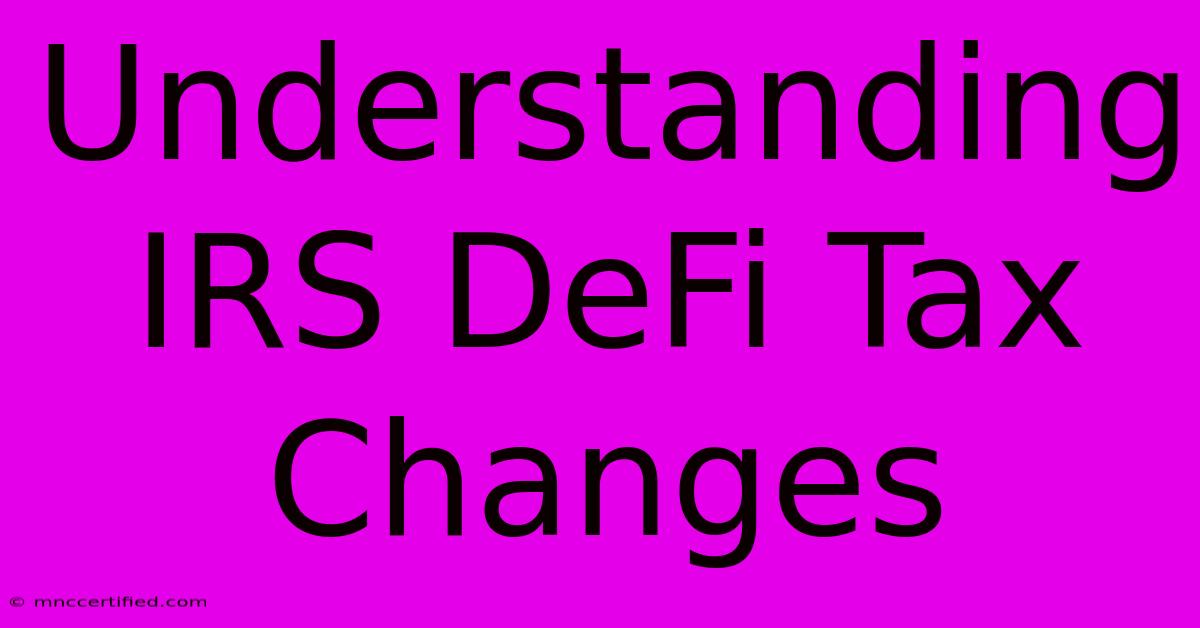Understanding IRS DeFi Tax Changes

Table of Contents
Understanding IRS DeFi Tax Changes: A Comprehensive Guide for Crypto Investors
The decentralized finance (DeFi) space has exploded in popularity, offering innovative financial products and services. However, this rapid growth has left many investors unsure about their tax obligations. The IRS is increasingly scrutinizing DeFi activities, leading to significant changes in how these transactions are taxed. This comprehensive guide breaks down the key tax implications of DeFi and helps you navigate the complexities of this evolving landscape.
What is DeFi and Why is the IRS Taking Notice?
Decentralized finance (DeFi) leverages blockchain technology to offer traditional financial services without intermediaries like banks or brokers. This includes lending, borrowing, staking, yield farming, and trading through decentralized exchanges (DEXs). The IRS is taking notice because DeFi's pseudonymous nature initially made tracking transactions challenging. However, advancements in blockchain analytics are making it easier to identify and trace DeFi activities, leading to increased scrutiny and enforcement.
Key DeFi Activities with Tax Implications:
- Yield Farming: Earning rewards by providing liquidity to decentralized exchanges or lending platforms is considered taxable income. The value of the rewards received (whether in the same cryptocurrency or a different one) is taxed at the time of receipt.
- Staking: Locking up cryptocurrencies to secure a blockchain network generates rewards. These rewards are also considered taxable income.
- Lending and Borrowing: Interest earned on lending platforms is taxable income. Conversely, interest paid on borrowed funds might be deductible, depending on the nature of the loan and your circumstances. Always consult a tax professional for personalized guidance.
- Trading on DEXs: Profits from trading cryptocurrencies on decentralized exchanges are taxable events, just like trades on centralized exchanges. You'll need to track the cost basis of your assets and calculate capital gains or losses.
- NFT Trading: Profits from buying and selling Non-Fungible Tokens (NFTs) are taxed as capital gains or losses, depending on the holding period.
Navigating the IRS's Approach to DeFi Taxation:
The IRS treats cryptocurrency transactions similarly to traditional assets. This means:
- Record Keeping is Crucial: Meticulously track all DeFi transactions, including dates, amounts, and the type of cryptocurrency involved. Use specialized crypto tax software to simplify this process. Failing to keep accurate records can result in significant penalties.
- Cost Basis Calculation: Determine the cost basis of your assets to accurately calculate capital gains or losses. This includes the initial purchase price, fees, and any other expenses incurred.
- Tax Form 8949: Report your cryptocurrency transactions on Form 8949, Sales and Other Dispositions of Capital Assets. This form is then used to complete Schedule D (Form 1040), Capital Gains and Losses.
- Form 1040: Ultimately, your DeFi income and capital gains/losses must be reported on your Form 1040, U.S. Individual Income Tax Return.
Minimizing Your Tax Liability:
While you can't avoid paying taxes on legitimate DeFi income, you can take steps to minimize your tax liability:
- Tax-Loss Harvesting: Offset capital gains by strategically selling losing crypto assets.
- Consult a Tax Professional: Seek advice from a CPA or tax advisor specializing in cryptocurrency and DeFi to develop a personalized tax strategy. They can help you navigate the complexities of DeFi tax laws and ensure you are compliant.
- Stay Updated: The DeFi space is constantly evolving, as are the tax regulations surrounding it. Stay informed about any changes to the IRS guidelines.
The Future of DeFi Taxation:
The IRS is actively working to improve its ability to track and tax DeFi activities. Expect to see more clarity and potentially stricter enforcement in the coming years. Proactive tax planning and accurate record-keeping are essential for navigating this evolving landscape.
Disclaimer: This information is for educational purposes only and does not constitute tax advice. Consult with a qualified tax professional for personalized advice tailored to your specific situation.

Thank you for visiting our website wich cover about Understanding IRS DeFi Tax Changes. We hope the information provided has been useful to you. Feel free to contact us if you have any questions or need further assistance. See you next time and dont miss to bookmark.
Featured Posts
-
Uscs Win A And M Game Highlights
Dec 28, 2024
-
Olivia Hussey Romeo And Juliet Star Passes Away
Dec 28, 2024
-
Hershey Family Fun 2025 Guide
Dec 28, 2024
-
Finding Vasile Nicolae In Barnard Castle
Dec 28, 2024
-
Beyond Paradise Christmas Full Cast List
Dec 28, 2024